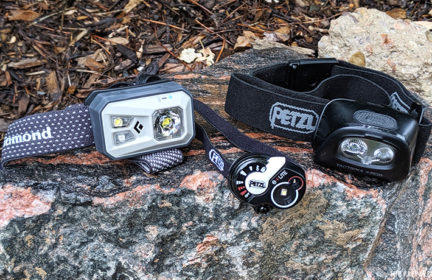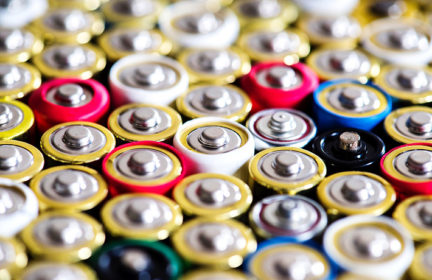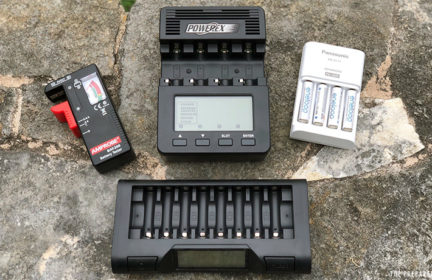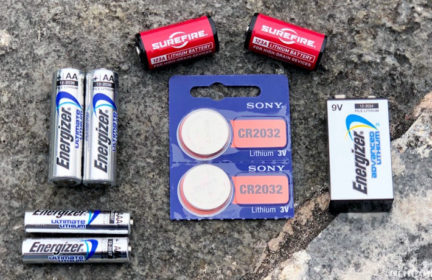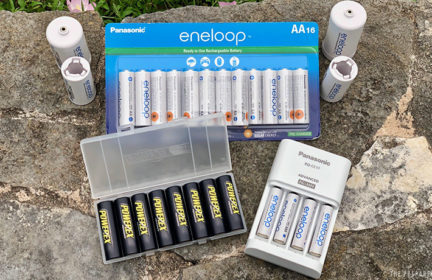Battery best practices
One of the main recommendations we make in our guide to rechargeable batteries, is that people should quit using alkalines and transition entirely to rechargeables. We have a couple good reasons for this that I wont’ get into, here (read the guide!)
But here’s the thing: I’m not actually doing this, and I’m the one who wrote the recommendations.
The reason I find myself unable to do this, is that the rechargeables are expensive, so I don’t want them to go into random kid toys and the like where they’re liable to get lost or thrown away. I hoard those things like the costly little gadgets they are. This means I end up buying alkaline batteries for kid toys and throwaway stuff, and since I have those on-hand I just use them for everything else, too.
So my stash of NiMH batteries sits mostly in special box with my chargers and other battery-related equipment.
I suspect I’m not alone in this approach, and that very few preppers are actually moving to NiMH in all daily-life use — despite the theoretical reasons why it’s a good idea. On this basis, then, I’m thinking of changing the battery guide language to reflect reality.
Does anyone have any thoughts on this? Have others made the jump to all-rechargeables? Or should I go ahead and concede that people will stick with alkaline, and then focus on storing the NiMH for emergencies?
-
Comments (19)
-
Josh CentersContributor - January 4, 2021
I personally use disposables in most things, Duracell Procells to be specific. However, I do have some Panasonic Enloops that I keep in my go-bag in plastic cases. I also buy rechargeables for things that burn through batteries quickly, like wireless keyboards.
-
matthew.Contributor - January 4, 2021
I can’t bring myself to fully move past disposable alkaline batteries. There is something wonderfully reassuring about buying a case of Duracells at Costco and stashing them away, knowing they’ll likely work well many years from now and won’t be reliant on a seperate power source to charge them. I think maintaining a healthy stash of alkalines is an important aspect of prepping, even if they are only a back-up for your flashlight and radio.
And of course the convenience of being able to just throw them into whatever device that needs them and not having to wait for the batteries to recharge is worth noting, but I realize in saying that that I am revealing my own bad habit of not always remembering to recharge my batteries!
-
Robert LarsonContributor - January 5, 2021
You know, I don’t really have many devices that run off of AA/AAA anymore. Most of the new electronic devices that I have bought recently have come with their own lithium ion battery. My wireless keyboard, flashlight, newer video game controllers and consoles, wireless earbuds, and more all have their own little battery that isn’t a AA/AAA.
That being said, I do have a few devices that still run off of AA/AAA. A headlamp, tv remote, and older video game consoles and controllers are pretty much all I can think of in my house that run off of AA/AAA. The TV remote AA batteries last over 5 years on the cheapest harbor freight batteries that I had gotten for free, so that is the only device that uses alkaline. The others are all rechargeable.
I can totally see where you are coming from with cheap kids toys not having your expensive rechargeables, and will probably do the same when I have kids.
So I am mostly all rechargables here, and think that most people can switch most of their electronics to the same, but having a good store of alkalines is smart.
-
hikermor - January 8, 2021
ditchd alkaleaks a few years ago and zero regrets. Replaced with eneloops and panasonic which work very well. Alkaline batteries are obsolete.
-
-
Bob - January 8, 2021
Jon,
A major problem is dealing in absolutes like “best” and “entirely”. We and the environment are just too diverse.
Some of the quality flashlights have their own docking station for charging – and can use the more available replaceable batteries when docking station not available. One example is the Streamlight Survivor model.
Recharging batteries on some boats’ electrical systems verbotten.
When in evac mode and herded into a makeshift emergency shelter, where does one recharge the batteries ? The school building’s electric sockets are all in use forever and ever.
Even the lithium-ion can degrade over time. Although rare, rechargeables can explode.
-
hikermor - January 17, 2021
When dealing with boats, evac shelters, and any situation where wall power is not available, power banks are the answer. they are available in many formats and forms and many are fully functional lights and lanterns as well. They can easily keep a cellphone charged. There is always the vehicle electrical system. My ultimate backup is a portable solar panel. This system has worked for me for up to ten days when out in the field.
-
-
Alicia - January 18, 2021
I read the battery guides just after I restocked my alkaline AA and AAAs from Costco. So I’ve not yet really expanded my collection of eneloops yet. I do plan to when the stash starts getting down to a reasonable size. I think I need to have enough such that I have a stash already charged to swap in. We humans tend to seek that instant gratification, plus I don’t really want to wait around to replace a battery in a difficult to hang clock or smoke detector.
Jon, I don’t think you should change your recommendations/language in the guides, as they are guides – not law :-). We can strive for better and I suggest you break the ice and replace the batteries in a flashlight. I have the sense that the rechargeable batteries should not fall prey to the leaking phenomenon so they should be better. I’ve had alkaline batteries leak in them for me before.
-
rangerjohn - March 21, 2022
I haven’t used alkaline batteries since Energizer Lithium batteries came out.I had tried to go with rechargeable batteries about ten years ago. Not Enloops. Didn’t work well then.
After reading the guides here, I have decided to give them another go, using Enloops, with the Ryno Tuff solar panel, and the Nitecore UMS-4 charger.
-
Gideon ParkerStaff - March 21, 2022
Probably 10+ years ago I bought some cheap rechargeable batteries from Harbor Freight and they worked, but not that well. They had a low capacity and not that many charge cycles. After recently buying the Amazon Basics brand, (which isn’t even close as good as Enloops) I am sold on rechargeables.
-
-
Amy S. - March 21, 2022
I haven’t bought or used disposable AA or AAAs in years. I use the reasonably priced EBLs and Amazon Basics in kid stuff. They work great.
-
M. E.Contributor - March 23, 2022
I decided to take the “Buy once, cry once” approach to batteries and I have tons of eneloops. I haven’t regretted it at all. There are a few random alkaline still floating around my house from the “before times” but if I ever need to restock (which will be a while since I went a LITTLE overboard with my stash), I’ll go for rechargeable again.
Sounds like a great time to teach those kids the value of power! 😉
-
Bill Masen - March 23, 2022
I have got rid of all my rechargables, some leaked ruining expensive cameras, flashlights and radios.
So now I cache Energiser Lithium batteries with long shelf lives for essential gear in my packs and vehicle kits usually AAA and AA with some CR 123A.
I used decent branded alkalines for none essential roles
-
Pops - March 23, 2022
I keep as many rechargeables as possible, having a thing and no battery makes no sense—and I’m old enough to have bought grandkids christmas and had no batteries, disaster.
All the stuff I might want “in case” is AA rechargeable, and I have just about any conversion/charging device I can find to get there:
PV to 120v AC, 48v DC, 12v DC
120v Ac to 48v DC Big Battery Bank (30kWh LiFePo)
48v DC to 120v AC
120v AC to 20v DC (dewalt), 12v DC, AA/AAA/14500 Li (flashlights), 5v USB bank
20v DC (dewalt) to 5v USB
12v to AA/etc, 5v
5v USB to AA/etcdid I miss one? LOL
There are different AA rechargeables, high drain/low capacity to low drain/high capacity. There used to be a site with great info but I can’t seem to find it. I’ve lots of different brands and really they all seem about the same to me: Basics, Energizer, Enloop, Tenergy, Panasonic (that makes Enloop I think)
-
Robert LarsonContributor - March 25, 2022
I think you have every rechargeable battery combination known to man! You are set.
-
-
RS - March 25, 2022
Just chiming in as another person who does use mostly rechargeables, and doesn’t think the guide needs to be redone. Maybe you can put in a note about the most likely issues people might face when trying to switch to using rechargeables, just so readers have a broader sense for why not everyone will want to switch to all rechargeables.
99% of the battery-powered things I use frequently get a rechargeable as they’re my mundane default for AAA/AA format battery power. However this happened, I don’t feel the need to save my rechargeables for special uses. Granted I also don’t worry about children taking batteries out of things, so I would absolutely put them into a remote (which hits the “mundane frequent use” threshold). The stuff that’s used less frequently tends to have a disposable stored somewhere near it (often not in the battery compartment itself).
So, for example, my rechargeable AAA/AA batteries are used for:
- wireless mouse
- pocket-carried flashlight(s)
- household thermometers (I have two that sit around for my own personal entertainment)
- camping headlamps (there’s some more nuance here, because I was burning through rechargeable batteries while winter camping with a metal-bodied headlamp, so I ended up getting an 18650-powered split headlamp for cold weather use, but in warmer weather, my lights use eneloop rechargeables and allow for potential during trip-recharging if needed).
- as backup batteries on trips (to put in a charged battery immediately while I lesiurely recharge the discharged original)
And some examples for the disposables:
- AA-powered radio (used infrequently enough that the first batteries I used in it have yet to need to be replaced)
- Home blood pressure cuff (same thing, still running on first set of batteries due to infrequent use)
- Back up options in storage if I needed to give out a battery (or otherwise strongly expect to lose the battery), and as emergency options if I somehow end up with discharged and no-way-to-recharge rechargeables.
-
Robert LarsonContributor - March 25, 2022
Have you ever had a rechargeable battery hit it’s maximum level of charge cycles and not hold a charge anymore? Just wondering what that looks like for you. The ones I’ve had die on me will come back with an error on the charger that it can’t charge anymore.
-
Pops - March 26, 2022
All rechargeables are rated by the number of cycles, along with power capacity and draw. I just searched on:
AA rechargeable battery comparison
and got lots of hits.This one has a list of some specs
This one has quick recommendations:
- If you want the best energy capacity (2550 mAh) — get the Eneloop Pro (about $18 for pack of 4)
- If you want maximum recharge capacity (2100 times) — get the 4th Generation Panasonic Eneloops (about $11 for pack of 4)
- If you are on a budget don’t mind a little less performance from your batteries — get the Powerex AAs (about $10 for pack of 4)
-
RS - April 6, 2022
@Robert Larson I have yet to hit a max charge cycle on any battery that I’ve noticed. I switched to rechargeables about two years ago (probably in response to the original article here, haha). Unfortunately I don’t label or otherwise keep track of the individual batteries, let alone their charge cycles. So I can’t tell for sure whether I’m regularly using the same batteries in the higher-discharge-rate use case (headlamps), or whether those are getting naturally swapped over to the lower-discharge-rate cases (mouse, thermometer, etc.) and my whole collection of batteries is has fewer recharge cycles under its belt. I’ll keep an eye out what happens with my headlamp batteries.
-
TheFuries - April 6, 2022
It would depend on the item.
We use alkalines for toys, rechargables for everything else, and lithium ion for cameras or very expensive equipment that we’d hate to have compromised (since rechargables have a small chance of exploding).
-
- News for the Week 2025-11-17 - 4 days ago
- News for the Week 2025-11-10 - 2 weeks ago
- News for the week of 2025-11-03 - 3 weeks ago
- News for the week of 2025-10-27 - 4 weeks ago
- News for the week of 2025-10-20 - 1 month ago
This forum is heavily moderated to keep things valuable to as many people as possible. Full community policies are here. The basics:
- 1. Be nice to each other.
- 2. Stay focused on prepping.
- 3. Avoid politics, religion, and other arguments.
- 4. No unfounded conspiracies, fake news, etc.
- 5. Debate ideas, not people.
